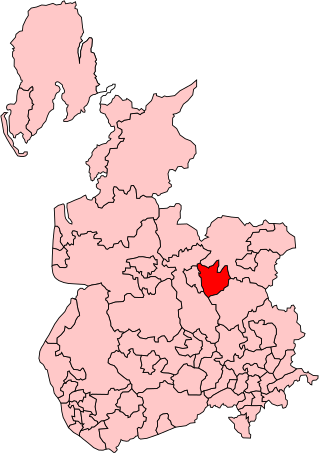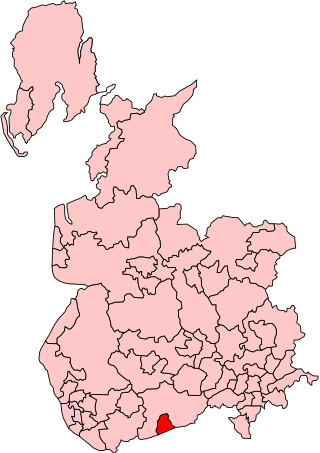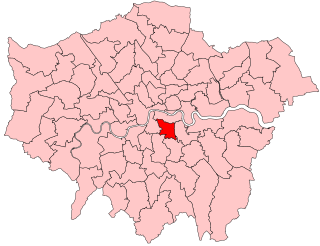Related Research Articles

Birkenhead is a constituency in Merseyside represented in the House of Commons of the UK Parliament since 2024 by Alison McGovern of the Labour Party.

Accrington was a parliamentary constituency of the House of Commons of the Parliament of the United Kingdom from 1885 to 1983. It elected one Member of Parliament (MP) by the first-past-the-post system of election.

Warrington was a parliamentary constituency in the United Kingdom. From 1832 to 1983 it returned one Member of Parliament (MP) to the House of Commons of the Parliament of the United Kingdom.

Hackney North was a parliamentary constituency in "The Metropolis". It returned one Member of Parliament (MP) to the House of Commons of the Parliament of the United Kingdom.
Bebington was a parliamentary constituency in the United Kingdom, which existed from 1950 to 1974. The constituency was centred on the town of Bebington on the Wirral Peninsula, England.

Wirral was a county constituency which returned one Member of Parliament (MP) to the House of Commons of the Parliament of the United Kingdom from 1885 to 1983, elected by the first past the post voting system.

Balham and Tooting was a constituency in South London, which returned one Member of Parliament (MP) to the House of Commons of the Parliament of the United Kingdom. It was created for the 1918 general election and abolished for the 1950 general election.

Peckham is a borough constituency in South London which returns one Member of Parliament (MP) to the House of Commons of the Parliament of the United Kingdom. Elections are held using the first-past-the-post voting system.
Birkenhead West was a parliamentary constituency that returned one Member of Parliament (MP) to the House of Commons of the Parliament of the United Kingdom, elected by the first past the post voting system.

Salford South was a parliamentary constituency in the City of Salford in Greater Manchester from 1885 until 1950. It returned one Member of Parliament (MP) to the House of Commons of the Parliament of the United Kingdom.
Birmingham West was a parliamentary constituency represented in the House of Commons of the Parliament of the United Kingdom. It returned one Member of Parliament (MP), elected by the first-past-the-post voting system.

Mile End was a parliamentary constituency centred on the Mile End district of the East End of London. It returned one Member of Parliament (MP) to the House of Commons of the Parliament of the United Kingdom.

Brixton was a parliamentary constituency centred on the Brixton district of South London. It returned one Member of Parliament (MP) to the House of Commons of the Parliament of the United Kingdom, elected by the first-past-the-post system.

Lambeth North was a borough constituency centred on the Lambeth district of South London. It returned one Member of Parliament (MP) to the House of Commons of the Parliament of the United Kingdom, elected by the first past the post system.
Birmingham Deritend was a constituency of the House of Commons of the Parliament of the United Kingdom from 1918 to 1950. It elected one Member of Parliament (MP) by the first-past-the-post system of election.
Birmingham King's Norton was a constituency of the House of Commons of the Parliament of the United Kingdom from 1918 to 1955. It elected one Member of Parliament (MP) by the first-past-the-post system of election.
Birmingham Moseley was a constituency of the House of Commons of the Parliament of the United Kingdom from 1918 to 1950. It elected one Member of Parliament (MP) by the first-past-the-post system of election.
Manchester Clayton was a parliamentary constituency in the city of Manchester. It returned one Member of Parliament (MP) to the House of Commons of the Parliament of the United Kingdom, elected by the first past the post system.
Richmond (1918–1983) was a parliamentary constituency centred on the town of Richmond. The seat mirrored for its first 47 years a small northern projection of Surrey. For the final 18 years its area, in local government, fell into the new county of Greater London.

East Ham South was a parliamentary constituency centred on the East Ham district of London, which was in Essex until 1965. It returned one Member of Parliament (MP) to the House of Commons of the Parliament of the United Kingdom, elected by the first past the post voting system.
References
- ↑ Fraser, Hugh (1918). The Representation of the people act, 1918 : with explanatory notes. University of California Libraries. London : Sweet and Maxwell.
- ↑ British Parliamentary Election Results 1918-1949, FWS Craig
- ↑ British Parliamentary Election Results 1918-1949, FWS Craig
- ↑ British Parliamentary Election Results 1918-1949, FWS Craig
- ↑ British Parliamentary Election Results 1918-1949, FWS Craig
- ↑ British Parliamentary Election Results 1918-1949, FWS Craig
- ↑ British Parliamentary Election Results 1918-1949, FWS Craig
- ↑ "Obituary: Sir Walter Fletcher Former M.P. For Bury". The Times. 7 April 1956. p. 11.
- ↑ British Parliamentary Election Results 1918-1949, FWS Craig
- ↑ British Parliamentary Election Results 1918-1949, FWS Craig
- Leigh Rayment's Historical List of MPs – Constituencies beginning with "B" (part 3)
- Craig, F. W. S. (1983) [1969]. British parliamentary election results 1918-1949 (3rd ed.). Chichester: Parliamentary Research Services. ISBN 0-900178-06-X.